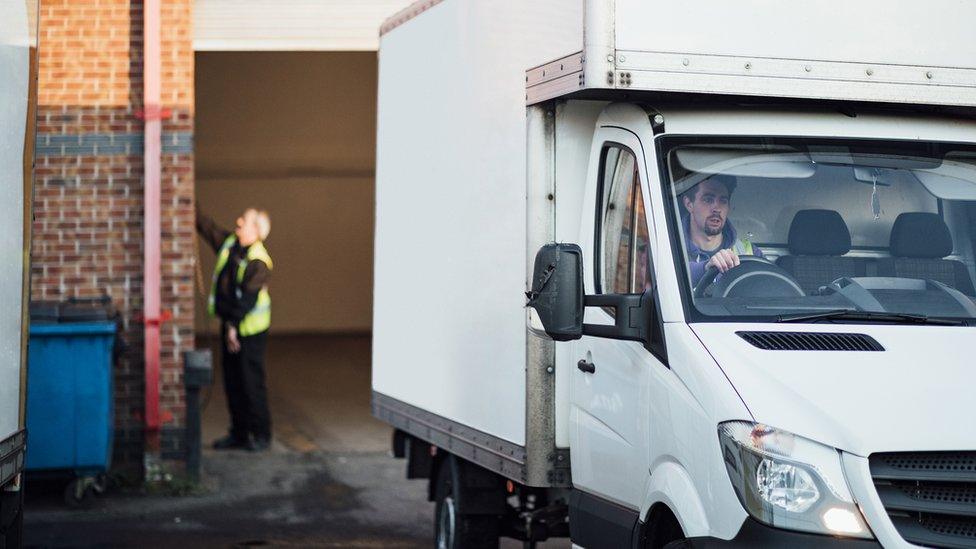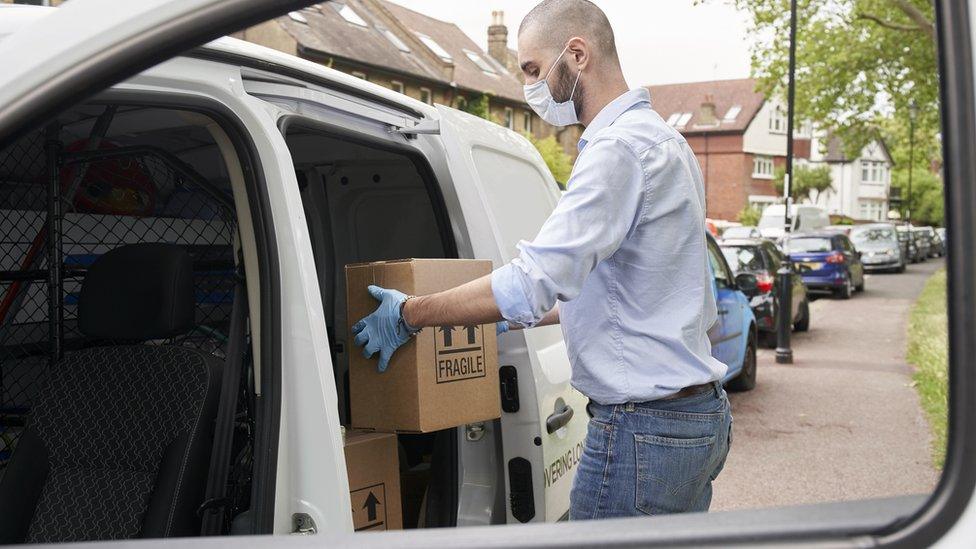Used commercial vans in short supply as demand rises
- Published

Vans are selling for 20% more than last year
With price inflation accelerating, used commercial vans share much of the same market disruption as cars, notably the global microchip supply shortage
House prices are also picking up pace, with Scotland ahead of the rest of the UK

Vans do well out of recessions. People thrown out of a job don't seem to get on a bike, as in the 1930s, but find a new cause that requires a few cubic metres of pulling power.
From gardening to delivery of online shopping, via practical trades and the construction industry, the van is the workhorse of the economy, and its brake horse power is most apparent in pulling Gross Domestic Product out of the ditch.
Barry Clarkson ought to know. His father started Clarkson commercial vehicles in Glasgow more than 40 years ago, so they've seen economic cycles come and go.
This is unprecedented, though. Second hand vans are selling for 20% more than last year.
He points to a tipper truck being driven away by its new owner, for the same price paid for it three years ago: "It doesn't sit easy with me. We've never seen this before. It's uncharted waters, for everybody related to motor vehicles."
These are not windfall gains for dealers. They are struggling to get stock, and having to go long distances to secure it. Vehicle transporters are much busier than usual moving stock around the country.
"The 20% increase doesn't come to us," says Clarkson. "Our margin has become more eroded, because I still believe we've got to offer the customer value, and that becomes difficult in the world we're now in."

Many people have been turning to new jobs that require some extra vehicle real estate
If you want a new van, you'll have to wait - perhaps for a year. So prices of used ones, immediately available, can be close to the price of a new one.
"We're in a super-heated situation," Clarkson told me. "There's a number of factors really beginning to choke the supply. It's a real frustration because there's pent-up demand as we're beginning to get back to normal. The demand's great but the supply's choked, and I don't see that resolving itself this year."
The leasing cycle has been punctured. A two or three-year lease is being extended by the leasing companies to four, because of the difficulty of getting new stock. So without those vehicles coming onto the used market, demand outstrips supply.
Trade sales
Much of this is true of the used car market as well. According to Sandy Burgess of the Scottish Motor Trade Association, it's clearest at the super-premium end of the market, where people have cash to waste.
Italian and German supercars are getting up to £30,000 more for a used model than they would have fetched last year.
Some are changing hands for more than one delivered, fresh from the factory, next year.
The Office for National Statistics published monthly data on Wednesday showing that price inflation was up to 2.5% for the year to June, and one of the main contributors was used cars, up by 4.4% in only a month.
The commercial van doesn't come into household expenditure, but it's important to every household.
And it has suffered in the same way as cars from the boost to demand from people coming out of lockdown. Many have more savings and don't want to risk infection on public transport, so a car is one solution.
Similarly, Barry Clarkson (his vans bear the slogan "no relation to Jeremy") notes lockdown has left people with the spare cash to spend on home improvements, so his commercial customers, including joiners, plumbers and landscape gardeners, are able to invest in vans - either replacements or more of them.

Used super cars are fetching high prices
In common with cars, production has suffered from the global shortage of microchips necessary for almost every aspect of a car, from the ignition to fuel monitoring, electronic entertainment and sensors for self-parking.
Also, vehicle production plants have been running slower due to assembly requirements for social distancing.
Brexit has some additional impact on slowing up the industry's supply chains, to and from across the English Channel, according to Sandy Burgess.
The Ford Transit van is now assembled in Turkey, inside the European customs union.
It dominates the UK market for lighter vans. The Society of Motor Manufacturers and Traders published data for the first half of this year showing more than 44,600 new Ford Transits have been registered.
Its nearest rivals, from Volkswagen, Mercedes and Vauxhall registered between 10,000 and 13,000.

There's a global shortage of microchips
Heavier commercial vehicles in the category up to six tonnes have had a better start to the year, up 88% on last year and roughly two-thirds of the total.
Despite supply constraints, new registrations of commercial vehicles, of up to six tonnes, was overall 76% up on last year's first-half figures, and ahead of the four-year average preceding that.
This year, so far: 191,513 new vans. Only 2016 and 2019 have been stronger. But in June, numbers were falling back sharply.
Those in the industry reckon that the global supply problems with microchips, new vans and new cars are not going to be resolved until at least next year.
Meanwhile, it's a good time to get a good price on trade-in, but be prepared for some steep prices for your next set of wheels.

House hike
A further note to the challenge of rising prices comes from the House Price Index. It's been frothy for several months, and the latest figures, for the year to May, saw a 12.1% boost to the average Scottish house price.
That takes it to a record £171,000, with terraced houses and greater Glasgow above average. Inverclyde's housing market has had several strong months, this one seeing 20% price inflation.
Orkney and Shetland are well ahead of that, but the small number of transactions makes the data unreliable.
Across the UK, prices were up by 10% over the same period - faster in north-west England, much less in London. The continuing temporary tax break still in place for England and Northern Ireland helps explain that.
But in Scotland, where a modest tax cut ended in March, it can largely be explained by further evidence of a lack of supply, allied to a post-lockdown desire to move to somewhere with more space.
It's no surprise that the housebuilders, including Persimmon and Barratt, have recently been reporting profits towards the upper end of expectations, or above.
